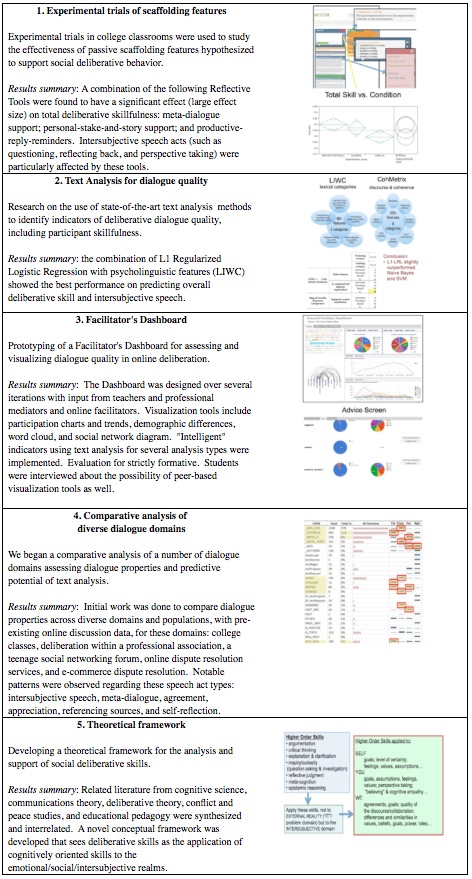Overview
A key human capacity is the ability to negotiate situations involving differing opinions where a resolution of ideas is sought, e.g., in dispute resolution,  collaborative problem solving, bargaining, and civic deliberation processes. The need for this deliberative capacity is seen in all realms of human activity from international politics, to collaborative work, to mundane familial squabbles. Conflict and difference too often result in unsatisfactory outcomes that can be attributed to insufficient skill, or an inability to bring existing skills to bear in difficult situations. Throughout the various contexts mentioned above many of the same underlying skills and capacities are called for.
collaborative problem solving, bargaining, and civic deliberation processes. The need for this deliberative capacity is seen in all realms of human activity from international politics, to collaborative work, to mundane familial squabbles. Conflict and difference too often result in unsatisfactory outcomes that can be attributed to insufficient skill, or an inability to bring existing skills to bear in difficult situations. Throughout the various contexts mentioned above many of the same underlying skills and capacities are called for.
We are exploring how to support these "social deliberative skills" in online dialogue, deliberation, and collaboration. Social deliberative skill refers to the capacity to deal productively with heterogeneous goals, values, or perspectives, especially those that differ from ones own, in deliberative situations. These skills include perspective taking and empathy, self-reflection on bias, tolerance for uncertainty and ambiguity, listening and question-asking skills, and meta-dialogue (and see (see skills list in Table below).
Summary of Outcomes
People are increasingly engaged in online dialogue, deliberation, and collaboration. The Internet provides opportunities for increased exchange of ideas, particularly with others who we may not have a chance to engage face-to-face. There is under-explored opportunity for online systems and tools to directly support participants in having higher quality and more skillful engagements. The overall goal of the project is to support higher quality online deliberation, especially by supporting social deliberative skills.
We attempt to do this through software tools and features, some of which directly support participants, and others which support facilitators or mediator as they engage with participants. To support participants we implemented unobtrusive reflective dialogue scaffolding features, and to support facilitators we implemented a "facilitators dashboard" visualization tool. We also investigated using state-of-the-art text analysis and machine learning to measure important properties of deliberative dialogue. In addition to the development and formative evaluation of these tools, we conducted experimental trials that showed, for a population of college students engaged in online discussion of controversial issues, that our reflective tools did indeed lead to deeper, more skilled, and reflective dialogue. Our work with automated text analysis has given early indications that automated methods for assessing the quality of online dialogue can be used productively to support higher quality communication (for instance through visualizing this information in the Facilitator's Dashboard).
Wider potential impacts
Our unobtrusive scaffolding methods and facilitator dashboard concepts will transfer to use in collaborative work, civic engagement, and online dispute resolution. Discussion forums and commenting features are widely used in educational contexts and social media, but little exists to support higher quality deliberation in these environments. Our methods should also be applicable to "flipped" classrooms and MOOC (Massive Online Open Course) environments, which are in need of better tools for interaction, dialogue, and management. We also believe that social deliberative skills practiced online will transfer to other contexts such as face-to-face communication.
Online Contexts
Many communication and collaboration interactions now take place on the Internet, which is becoming a ubiquitous global social communication medium. Our focus is on supporting mutual understanding and high quality satisfactory outcomes between individuals and/or groups who are communicating with online tools. This approach to skill and capacity building is not through traditional instructional methods, but by providing scaffolded support in the context of real tasks done with familiar tools. Online work and communication provides unique opportunities because the communication medium itself (not only the content but the prompts, constraints, and choices that the interface affords the user) can be structured to directly guide and support skill building and sustained skill use.
We are developing software tools to support participants and facilitators engaged in online deliberative discourse ("deliberation" goes beyond collaborative "dialog" to imply critical thinking, decision making, and meaning-generation) that prompts, reminds, and scaffolds participants to draw their attention to important features of the deliberative situation.
Table of Social Deliberative Skills
| Basic Social Deliberative Skills | Reflective Social Deliberative Skills |
|---|---|
|
|



